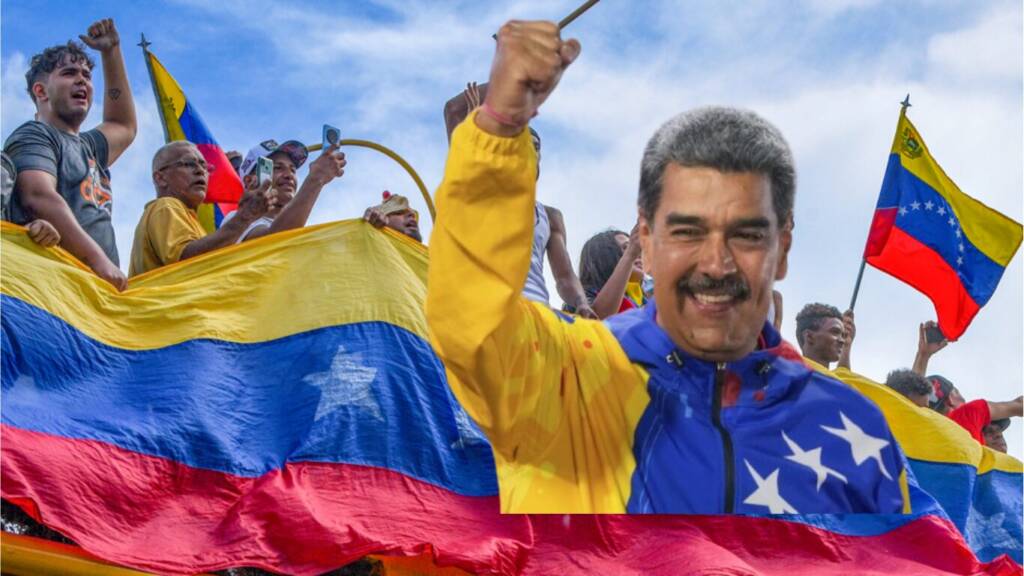Venezuela’s ruling party, led by President Nicolás Maduro, has claimed a major victory in the 2025 regional and parliamentary elections. However, the results are being questioned by many, both inside and outside the country. Most opposition groups boycotted the elections, calling them unfair and a way for Maduro to tighten his grip on power.
Massive Win for Maduro’s Party
According to Venezuela’s National Electoral Council (CNE), which is dominated by government loyalists, the United Socialist Party of Venezuela (PSUV) won 23 out of 24 governor races. The PSUV and its allies also claimed 82.68% of the vote for the 285-member National Assembly, giving them control of almost all important institutions, including the judiciary and attorney general’s office.
President Maduro celebrated the outcome, calling it a “victory of peace and stability.” He said the results show the continued strength of Chavismo, the political movement started by former President Hugo Chávez.
Opposition Boycott and Low Turnout
Most major opposition parties refused to take part in the vote. They argued that the elections were unfair because the results of the 2024 presidential election, in which Edmundo González was widely believed to be the real winner, were not respected. The CNE had declared Maduro the winner of that vote without publishing full results, drawing international criticism.
María Corina Machado, a leading opposition figure, led the call to boycott Sunday’s vote. She said that voter turnout was less than 15% and described the elections as a “farce.” The CNE, however, claimed turnout was 42.6%, with about 8.9 million people voting out of 21 million eligible voters.
Independent journalists and observers reported empty polling stations and a lack of voter enthusiasm, especially when compared to last year’s presidential election.
Divided Opposition
While most opposition leaders boycotted the elections, a few chose to run, believing it was important not to leave the field entirely to the government. Former presidential candidate Henrique Capriles, Governor Manuel Rosales of Zulia, and Juan Requesens were among them.
Capriles was elected to the National Assembly, while Rosales lost his governorship. Their decision to participate caused tension within the opposition, with Machado accusing them of “betraying the cause.”
Crackdown Before the Vote
In the days leading up to the election, the government arrested more than 70 people linked to the opposition. Authorities claimed they were plotting to sabotage the elections. Among those arrested was Juan Pablo Guanipa, a close ally of Machado. She called these arrests “state terrorism.”
This wave of arrests added to the climate of fear and distrust surrounding the elections and made it even harder for the opposition to organize effectively.
Disputed Vote in Essequibo Region
One of the most controversial moves by the Maduro government was holding a symbolic vote in the Essequibo region. This oil-rich area is claimed by Venezuela but has been controlled by Guyana for decades.
Despite an order from the International Court of Justice (ICJ) telling Venezuela not to take any action to change the status of the territory, Caracas created a small voting district in Bolivar state near the Guyanese border. Voters there were asked to elect representatives and a “governor” for Essequibo.
An admiral loyal to Maduro, Neil Villamizar, won the vote and was declared governor—even though Venezuela does not control the territory. Guyana’s President Irfaan Ali called the move “scandalous, false, and propagandistic.”
What This Means for Venezuela
The elections have given Maduro even more control over Venezuela’s political system. With the ruling party in charge of nearly all state institutions, it will be harder for the opposition to challenge him through legal or political means.
Meanwhile, the opposition remains divided. The executive secretary of the opposition alliance, Omar Barboza, stepped down in March, blaming internal disunity. This disarray weakens any chance of mounting a strong resistance to Maduro’s rule.
International Reactions and Future Challenges
The elections have drawn international concern. Many countries, including the United States, do not recognize Maduro’s government as legitimate. The U.S. had briefly relaxed oil sanctions in 2022 after Maduro promised to work toward fair elections, but recent developments may change that. Already, Washington has started deporting Venezuelan migrants and cutting off deals with Venezuelan oil companies.
The political crisis is far from over. With a weakened opposition, increased repression, and worsening economic conditions, Venezuela faces a tough road ahead. For now, Maduro remains firmly in control—but questions about legitimacy and democracy in the country are louder than ever.
